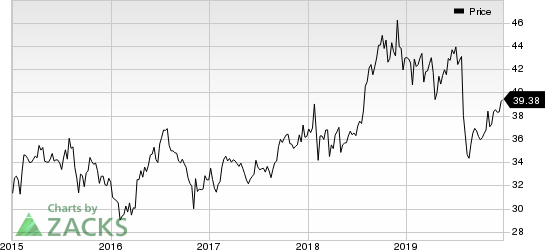Pfizer (PFE) Sees a Difficult 2019: Can it Rebound in 2020?
Pfizer Inc. PFE is one of the biggest drugmakers in the world, boasting a diversified portfolio of drugs and a strong pipeline.
However, the year 2019 has not been a smooth sail for the company. The stock has declined 9.8% so far this year against the industry’s rally of 11.6%.

During the period, Pfizer faced a major setback when one of its key drugs Lyrica lost exclusivity in the United States in July. LOEs (loss of exclusivity) are expected to hurt current-year sales by $2.1 billion.
Other products like Chantix and Sutent will lose exclusivity in the United States in the next couple of years. Pfizer saw incremental business development activity in 2019. The company merged its Consumer Healthcare unit with GlaxoSmithKline GSK to establish a joint venture (JV). While the former owns 32% stake in the JV, the latter holds the remaining 68%. In July, Pfizer bought Array BioPharma for $48 per share in cash for a total enterprise value of approximately $11.4 billion in a bid to strengthen its cancer portfolio.
Importantly, in July, Pfizer announced a definitive agreement to spin off its Upjohn unit and combine it with the generic drugmaker Mylan MYL in a Reverse Morris Trust transaction to create a generic pharmaceutical company, which will be called Viatris. This downside is probably because the drugs divested were key cash flow generators for Pfizer and funded its R&D efforts. The divestiture of Upjohn will significantly lower Pfizer’s cash resources.
The transaction is expected to close in mid-2020.
Moreover, Pfizer’s sterile injectables portfolio is seeing lower revenues since the last few quarters due to continued legacy Hospira product shortages in the United States. Though some recovery was seen in the third quarter of 2019, we would like to wait for more sustainable improvement.
Moreover, unfavorable changes in recommendation guidelines for Prevnar 13 and negative FDA updates on Xeljanz U.S. label may dent sales of these key drugs in the future quarters.
In July, Xeljanz’s prescribing information in the United States was updated by the FDA to include two additional boxed warnings as well as changes to the indication and dosing for ulcerative colitis following review of a post-marketing study.
Meanwhile, due to some unfavorable revisions in Advisory Committee on Immunization Practices’ (ACIP) pneumococcal vaccination guidelines for Prevnar 13 in adults across the United States, Pfizer expects some decline in demand for Prevnar, which can weaken its sales in the future quarters.
Can the Scenario be Better in 2020?
Despite the aforementioned headwinds, not everything went wrong for Pfizer in 2019 as it has its own share of strengths too.
Notably, the company had a strong third quarter, surprising investors, as it beat on both earnings and sales while raising its guidance for the bottom line.
The company secured FDA approval for four new cancer medicines last year, which can boost its oncology sales in future years. Biosimilar versions of Roche’s RHHBY cancer drugs Herceptin (Trazimera), Avastin (Zirabev) and Rituxan (Ruxience) and AbbVie’s Humira (Abrilada) were approved by the FDA in 2019, which can contribute to sales next year, once launched.
The company also flaunts a solid pipeline and looks well-positioned to deliver several innovative medicines in the next five years. These new breakthroughs bode well for the long term. Pfizer expects approximately 25-30 drug approvals through 2022 including the nod for 15 products with blockbuster prospects. The recent acquisitions and licensing deals strengthened its product portfolio.
Strikingly, the Consumer Healthcare joint venture with Glaxo, the Array acquisition and the pending merger of Upjohn unit with Mylan, if successful, will make Pfizer a smaller entity with a prolific portfolio of innovative drugs and vaccines. The smaller Pfizer should see better revenue growth as the Lyrica LOE cliff will also go away. Meanwhile, the company anticipates consistent growth of its key brands like Ibrance and Eliquis as well as biosimilars to aid sales in 2020.
Though Pfizer’s stock has declined in 2019, we expect the same to recover in 2020.
Moreover, the company currently carries a Zacks Rank #2 (Buy). Its earnings estimates have moved 2.8% north for 2020 over the past 60 days. You can see the complete list of today’s Zacks #1 Rank (Strong Buy) stocks here.
Pfizer Inc. Price

Zacks Top 10 Stocks for 2020
In addition to the stocks discussed above, would you like to know about our 10 top tickers for the entirety of 2020?
These 10 are painstakingly hand-picked from over 4,000 companies covered by the Zacks Rank. They are our primary picks to buy and hold. Start Your Access to the New Zacks Top 10 Stocks>>
Click to get this free report GlaxoSmithKline plc (GSK) : Free Stock Analysis Report Pfizer Inc. (PFE) : Free Stock Analysis Report Roche Holding AG (RHHBY) : Free Stock Analysis Report Mylan N.V. (MYL) : Free Stock Analysis Report To read this article on Zacks.com click here. Zacks Investment Research

 Yahoo Finance
Yahoo Finance 